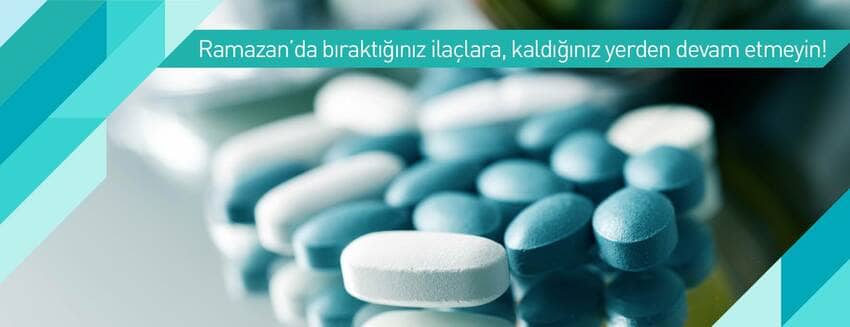
Üsküdar University NPISTANBUL Brain Hospital Psychiatry Specialist Mahir Yeşildal warned about the use of medication after Ramadan.
People who stop taking their medication during this period continue to take their medication after the holiday. Going out of the treatment routine causes different reactions in the body and poses a danger to people's health. Experts warn against continuing the medications stopped as of Ramadan without consulting a doctor.
Üsküdar University NPISTANBUL Hospital Psychiatry Specialist Mahir Yeşildal warned about the use of medication after Ramadan.
Do not restart your medication by saying "This was my medicine anyway"
Psychiatry Specialist Mahir Yeşildal pointed out that interrupting medication in psychiatric diseases increases the risk of exacerbation of the disease and said:
"One of the most important things we can say is the risk of exacerbation of diseases. For example, a patient taking medication for anxiety or depression does not get worse the day they stop taking it. These drugs usually have a long half-life and their activity in the brain lasts for about two weeks after stopping the drug. Unfortunately, we see an increase and exacerbation of these diseases in the second half or the last week of Ramadan after stopping the medication. At this point, our most important advice to our patients is not to say 'This was my medication anyway' and start taking their own medication again. They should immediately contact the psychiatrists who follow them and make a decision with the guidance and recommendation of the psychiatrist and start the medication correctly. Because as you know, these medications are usually started slowly, the dose is gradually increased, and when discontinued, the dose is reduced and the medication is discontinued. A patient who worsened towards the end of Ramadan should not start the medication with the same high dose. Of course, this does not mean 'start the medication at a low dose'. We now have a psychiatrist almost everywhere in Turkey. In such a case, you should definitely contact the psychiatrist who follows you or is closest to you quickly and organize the appropriate treatment accordingly."
Taking a break from medication for 1 month causes changes in brain receptors
Speaking about the effects of a one-month break in medication on the brain, Mahir Yeşildal said, "Let's say our patients took a break from their medication on their own during Ramadan and they are thinking of starting their medication again on Eid. Here, this one-month break causes a change in the brain, especially on the receptors of substances such as serotonin, dopamine, noradrenaline, and the drug you used a month ago may cause a different reaction when you start using it again after a month break."
Psychiatry Specialist Mahir Yeşildal emphasized that people should definitely start their medication in consultation with their physicians and said, "You have already made a mistake by leaving the medication on your own, but we need to pay attention to that scientific and medical situation at least at the point of restarting."
Eid has a different meaning for alcohol and substance users
Psychiatry Specialist Mahir Yeşildal stated that alcohol and substance addicts take a break during Ramadan and talked about the situation of addicted patients as follows: "We have a cultural approach such as 'I don't drink during Ramadan'. Since they don't drink during Ramadan, these patients, especially some of them, can infer that 'I can not drink even for a month during Ramadan, so I am not addicted'. No, this has nothing to do with them not being addicted. It has to do with their spiritual beliefs and of course it is important for them to be able to stop, but for people who use alcohol and drugs, Eid has a different meaning. Because they haven't drunk or used anything for a month and at the end of the first month, at the end of the feast, they may say 'I haven't drunk for a month anyway' and consume alcohol or substances intensely. This in itself has very serious risks. For one thing, if you have not used alcohol or drugs for a month, this is a very important development; however, the minute you take a sip or a sip of alcohol or drugs, you are medically labeled as 'addicted'. The lower limit for this is 1 year. If you have not stopped using drugs or alcohol for less than 1 year, it is not possible to say that your addiction has ended. A person who drinks the same amount of alcohol on Eid as before Ramadan can develop a picture we call alcohol poisoning, and these are the cases we see most frequently in our psychiatric emergencies during Eid."
